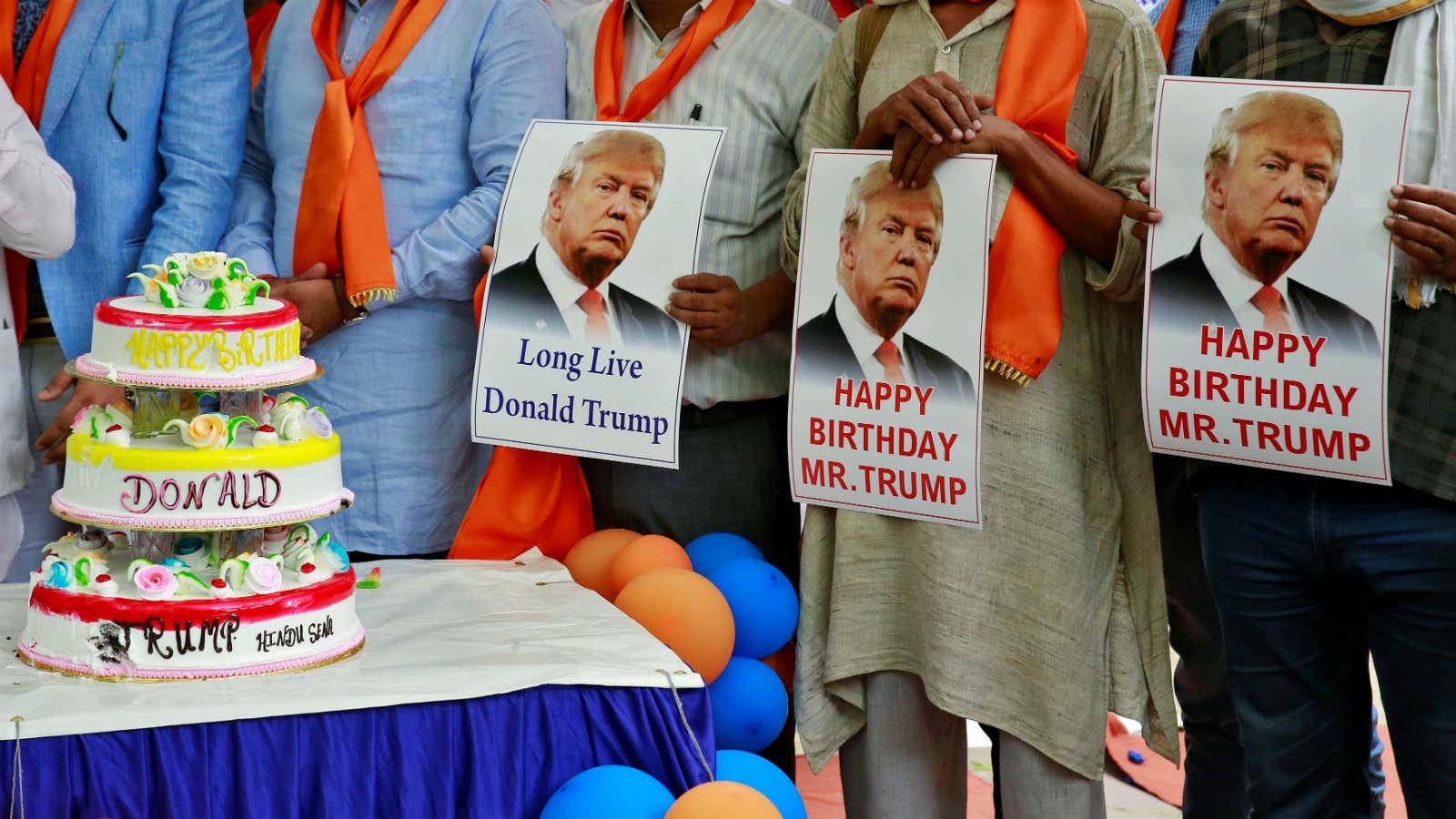“You turned out to be just like us.”
That’s what Pakistani poet Fahmida Riaz said in her 2015 poem Tum bilkul hum jaise nikle, addressed to India just as it was experiencing violent convulsions fueled by religious extremism. The line was a wry warning to a country that usually takes pride in being a more progressive, liberal, and secular democracy than its neighbor. ”Don’t become another Pakistan,” Riaz said after reports surfaced of lynchings in India over dietary preferences and the daytime murder of intellectuals.
Such violence was (rightly) said to be a product of religious chauvinism in India, chauvinism that intensified with the election of Narendra Modi in 2014. Today, as the United States braces itself for the presidency of a known xenophobe, Indians might as well be murmuring Riaz’s words under their breath.
The parallels
“The election of Donald Trump to the presidency is nothing less than a tragedy for the American republic, a tragedy for the constitution, and a triumph for the forces, at home and abroad, of nativism, authoritarianism, misogyny, and racism,” David Remnick wrote in the New Yorker.
Indeed, Trump is just the latest strongman leader—see: Vladimir Putin, Shinzo Abe, Recep Tayyip Erdogan, Rodrigo Duterte, Modi—to rise to the top. Their brand of alpha male nationalism plays on the perceived slights of the past suffered by their core constituencies: Trump’s whites and Modi’s upper-caste Hindus, for instance. They whip up passions, seeking to avenge these slights and turn on imagined internal enemies. They’re not unfamiliar with a dog whistle.
In the run-up to their respective elections, both Trump and Modi appealed to baser instincts. Modi couched his message in the conciliatory language of development, even as he dropped deliberate hints that villainized non-Hindus. What Remnick says of Trump—”a con who did little to spurn endorsement by forces of xenophobia and white supremacy”—is also true for Modi. Even outside of the support he received from those looking to marginalize non-Hindus, the prime minister’s strategic silences during social upheavals were akin to a nudge-and-wink at his followers’ depravity.
Take, for instance, the pronouncements of Yogi Adityanath, a particularly vicious second-rung parliamentarian of Modi’s Bharatiya Janata Party (BJP). Often heard ordering his ideological opponents to move to Pakistan, Adityanath was reprimanded by the Indian election commission over his hate speech. Another BJP lawmaker, Sadhvi Prachi, has called for a Muslim-free India. There are other virulent elected and unelected Hindutva leaders, too, whom Modi has refused to rein in.
Trump, meanwhile, has done more than nudge and wink. He has brazenly mocked the mentally disabled, supported physical assaults on protesters at his rallies, and outlined American policy based on prejudice against Muslims. Unlike Modi, Trump has left no room for ambiguity.
Yet…
Trump’s loathsome behavior gave many the impression that the US wouldn’t elect him under any circumstance. How could a civilized people choose this man, who boasts of sexually harassing women, as their leader? How could the bastion of free speech fall to someone who goads his followers into punching protesters? While Modi was an elected leader of some repute before his election, Trump’s calling card has been his inexperience with the political establishment and his outright disregard for propriety. In India, a man of his stature could just about rub shoulders with Adityanath or Prachi.
Yet here Trump is, standing tall amidst the ruins of the sacred pillars of democracy. Proudly trampling on America’s most zealously held values, ironically at the behest of half of Americans. The world is gobsmacked. So is India, or at least a section of it.
Despite a long history of geopolitical and ideological differences, the import of a free, liberal, secular democracy has tethered India and the US, however tenuously. Since India began opening up its economy in the 1990s, that relationship has only deepened. Drawing comparisons between India and US on the political, legal, and social front is not uncommon in India, be it gay rights, women’s empowerment, religious freedom, or racial equality.
So on Nov. 8, when the US voted for Trump, Indians who had looked to America for democratic solace found themselves deeply disappointed. Yes, we have our Modi. But, come on, you chose an Adityanath?
We welcome your comments at ideas.india@qz.com.
